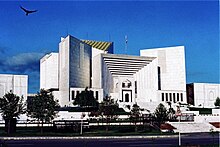Tassaduq Hussain Jillani | |
|---|---|
| تصدق حسین جیلانی | |
| 21st Chief Justice of Pakistan | |
| In office 11 December 2013 – 5 July 2014 | |
| Nominated by | Nawaz Sharif |
| Appointed by | Mamnoon Hussain |
| Preceded by | Iftikhar Muhammad Chaudhry |
| Succeeded by | Nasir-ul-Mulk |
| Acting Chief Election Commissioner of Pakistan | |
| In office 17 August 2013 – 30 November 2013 | |
| Preceded by | Fakhruddin G. Ebrahim |
| Succeeded by | Nasir-ul-Mulk |
| Justice of the Supreme Court of Pakistan | |
| In office 31 July 2004 – 11 December 2013 | |
| Justice of the Lahore High Court | |
| In office 7 August 1994 – 31 July 2004 | |
| Nominated by | Benazir Bhutto |
| Appointed by | Chaudhry Altaf Hussain |
| 21st Advocate General Punjab | |
| In office 26 July 1993 – 18 November 1993 | |
| Governor | Iqbal Khan |
| Preceded by | Khalil-ur-Rehman Ramday |
| Succeeded by | Mian Abdul Sattar Najam |
| Personal details | |
| Born | 6 July 1949 Multan, Punjab, Pakistan |
| Nationality | |
| Relations | Jalil Abbas Jilani (brother) |
| Alma mater | Forman Christian College University of the Punjab |

Tassaduq Hussain Jillani (born 6 July 1949) is a Pakistani judge who served as the 21st Chief Justice of Pakistan from 2013 to 2014. He previously served as a justice of the Supreme Court of Pakistan from 2004, after being nominated as a justice of the Lahore High Court by Prime Minister Benazir Bhutto in 1994.
Born in Multan, Jillani was educated at Forman Christian College and University of the Punjab. He served as Advocate General Punjab in 1993 before his elevation as judge. While seated on the Supreme Court, Jillani refused to take oath under General Pervez Musharraf during emergency rule in 2007, and his post was rendered nonfunctional. After the Lawyers' Movement, he was restored to the bench in 2009.
Considered a progressive judge, Jillani was a strong proponent of civil liberties and fundamental rights, authoring landmark decisions on women's rights, honour killings, and the right to education.[1][2][3][4] He also authored the suo moto decision on the protection of minorities and freedom of religion after the Peshawar church attack in 2013, widely held as the broadest interpretation of religious freedom laws in Pakistan's history.[5][6][7]
His name was proposed for caretaker prime minister by opposition party Pakistan Tehreek-e-Insaf in 2018.[8]
- ^ "Judiciary has crucial role in protecting human rights: CJP Jillani".
- ^ APP (13 May 2014). "Offence against any religion comes under blasphemy law: CJ".
- ^ The News: Mr Jillani, the new Chief Justice of Pakistan, December 25, 2013
- ^ Web Desk (27 November 2013). "Nawaz approves Justice Tassaduq Jillani as new Chief Justice". Express Tribune. Retrieved 25 December 2013.
- ^ SMC 1 of 2014, Supreme Court of Pakistan website
- ^ The News On Sunday, A judgment on minorities, July 6 2014
- ^ "Destined to fail - Daily Times". 22 July 2014.
- ^ "PTI proposes Dr Ishrat Hussain, ex-CJ Jilani for caretaker PM". www.thenews.com.pk. Retrieved 18 April 2018.